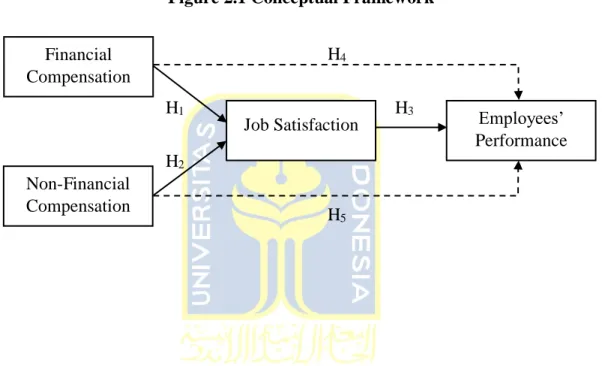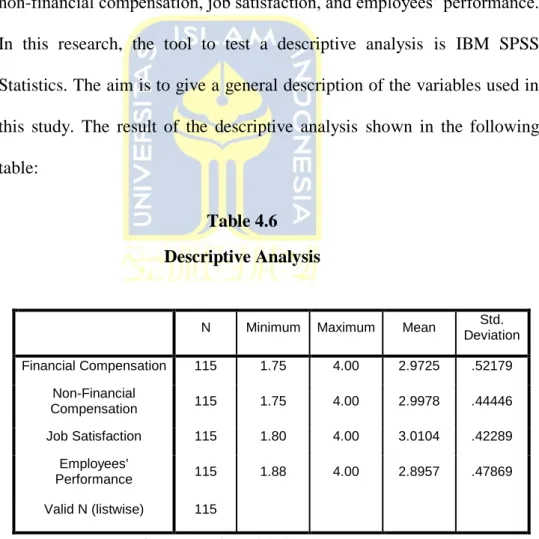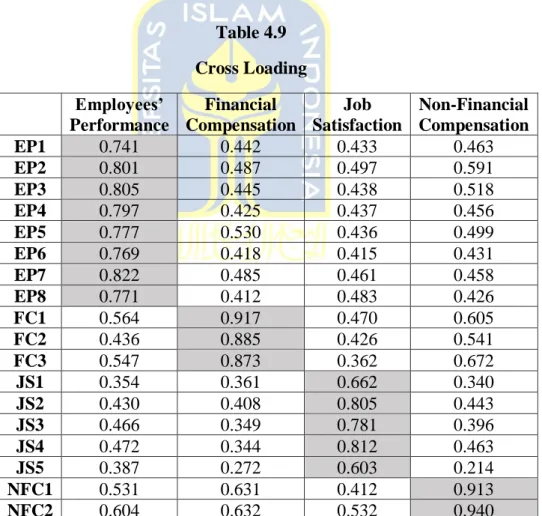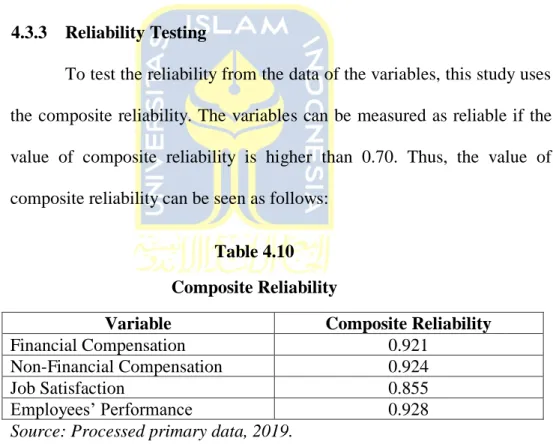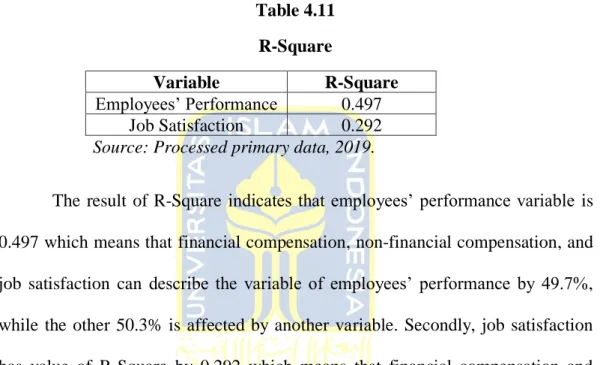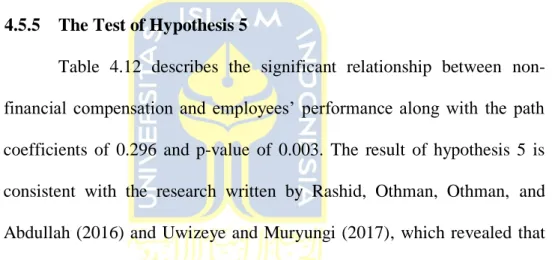THE INFLUENCE OF FINANCIAL AND NON-FINANCIAL COMPENSATION ON EMPLOYEES' PERFORMANCE THROUGH JOB SATISFACTION AS AN INTERMEDIATE VARIABLE. The influence of financial and non-financial compensation on employee performance through job satisfaction as an intervening variable" as a partial requirement to obtain the bachelor's degree in International Program, Department of Accounting, Faculty of Economics, Universitas Islam Indonesia is finally finished. Allah SWT, Alhamdulillahi rabbil 'alami, thank you for every blessing, guidance and mercy so that my good intention can be addressed to give benefits to others, inshaallah.
Thanks for everything, I couldn't even stop listing it one by one. Thank you for saving your time and support as I could finish my thesis within 3 months. The result shows that financial and non-financial compensation affects employees' performance and job satisfaction.
It can be concluded that financial and non-financial compensation can satisfy employees and improve their performance.

- Study Background
- Problem Formulation
- Research Objectives
- Research Contribution
- Systematic of Writing
The existence of a compensation system within the company aims to encourage and improve employee performance and to provide satisfaction with work performance. According to Chiang and Birtch (2011), an organization consists of two main categories of compensation which are financial and non-financial. One of the best ways to increase employee performance capacity and employee satisfaction is to relate compensation to employee development.
To improve employee performance and job satisfaction, a company must make both financial and non-financial efforts. Providing appropriate financial and non-financial compensation to employees should always be developed, because the satisfaction factor of human resources can improve the performance of employees to achieve the business objectives. Therefore, this issue is examined in this study entitled "The Influence of Financial and Non-Financial Compensations Toward Employees' Performance through Job Satisfaction as an Intervening Variable".
The main objective of this research is to determine the impact of financial and non-financial compensation on employee performance.
Theoretical Framework
- Agency Theory
- Expectancy Theory
- Definition of Compensation
- Type of Compensation
- The Purposes of Compensation
- Definition of Job Satisfaction
- The Factors Influence Job Satisfaction
- Definition of Performance
- Assessment and Measurement of Performance
- The Elements of Performance Assessment
Employees will be able to satisfy their physical needs and social status so that they will be satisfied in their workplace. Basically, job satisfaction is something personal, which means that each employee has a different level of satisfaction according to the value system that applies to him. According to Kreitner and Kinicki (2008), job satisfaction is efficiency or an emotional response from various aspects.
On the other hand, Robbins and Jugde (2013) stated that job satisfaction is a positive feeling about work. Thus, job satisfaction can be defined as something that explains the level of job satisfaction of employees (Griffin, 2017). Job satisfaction also indicates the fit between the expectations and rewards provided by the job (Robbins & Judge, 2013).
Employee satisfaction is a phenomenon that management must monitor, because job satisfaction and employees are the same.
Previous Research
Another study was written by Mabaso and Dlamini (2017) investigating the impact of compensation, benefits on job satisfaction among academic staff in higher education institutions in South Africa. Thus, only the compensation variable significantly predicted job satisfaction among academic staff in South Africa. The fourth journal article was written by Khan, Nawaz, Aleem and Hamed (2012) regarding the impact of job satisfaction on employee performance which was observed in Pakistan Medical Institution.
The purpose of this study is to find out the factors that influence the level of job satisfaction among employees in medical institutions and its impact on their performance. Job satisfaction variables-salary, promotion, safety and security at work, working conditions, autonomy, relationship with co-workers, relationship with supervisors have positive impact on job satisfaction and employee performance. Akbar, Riaz, Arif and Hayat (2018) measured non-financial rewards in scaling employee job satisfaction in Pakistani private companies.
The study aims to measure the impact of non-financial rewards on job satisfaction at the workplace in Pakistan private companies. The result showed that R-square has 75.6% impact on employee job satisfaction of recognition, flexible work arrangements, promotion opportunities, feedback to employees, promotion, empowerment, job autonomy, competitive work environment, individual reward preference, which means that non-financial reward has a significant effect on job satisfaction. A research written by Bawoleh, Pangemanan and Tielung (2015) analyzed the effect of motivation and compensation regarding job satisfaction in PT.
The purpose of this study is to recognize the significant effect of motivation and compensation on job satisfaction simultaneously, partially. The result showed Ftest with 14.200 is greater than Ftable of 3.35 which means that there is simultaneously and partially a significant effect on motivation and compensation on job satisfaction. Theodore and Lilyana (2017) investigated the effect of compensation and job satisfaction on employee performance in PT Karta Canggih Mandiri Utama.
The study aims to find out the impact of compensation and job satisfaction on employee performance. The study showed that Ftest was 24.950 while Ftable is 3.30 which means it is proven that compensation and job satisfaction affect employee performance.
Hypothesis Formulation
Thus, from a monetary point of view, financial compensation can enhance the improvement of job satisfaction. Economic theory and expectation theory thus have a direct connection with financial compensation and job satisfaction. H1: Financial compensation has a positive influence on job satisfaction According to Dzuaranin (2012), a company that only provides financial compensation must also provide non-financial compensation to increase employee satisfaction.
It is in line with Pragya (2008) that the relationship between job satisfaction and non-financial reward can be increased. From economic theory and expectation theory, non-financial reward is directly related to job satisfaction. It shows the importance of non-monetary compensation, such as an environment that can satisfy employees.
The research by Uwizeye and Muryungi (2017) stated that financial reward has a strong and positive relationship with employee performance. Supriyanto (2017) that financial compensation is the highest load value and has a direct effect on employee performance. Hence, financial compensation components such as salary, wages, bonuses and incentives can improve employee morale.
H4: Financial compensation has a positive effect on employee performance According to Dessler (2008), non-financial compensation is motivation in the form of providing spaces that support work. Non-financial compensation consists of satisfaction that employees gain from the job itself or from the psychological environment in which they work (Simamora, 2006). Research by Rashid, Othman, Othmand and Abdullah (2016) and Uwizeye and Muryungi (2017) proved that non-financial compensation has a positive effect on job performance.
As previously explained, economic and expectancy theories are related to non-financial compensation and employee performance. Non-financial compensation components consist of work environments, work desk, training and development opportunities and these can affect employees.
Conceptual Framework
31
Type of Research
Population and Sample
Technique of Data Collection
Research Variable and Measurement
- Employees’ Performance
- Job Satisfaction
- Financial Compensation
- Non-Financial Compensation
Data Quality
- Validity Test
- Reliability Test
Technique of Data Analysis
- Descriptive Analysis
- Data Analysis
- Outer Model
- Inner Model
- Hypothesis Testing
Result of Data Collection
Descriptive Analysis
- The Characteristics of Respondents Analysis
- Descriptive Analysis of Research Variables
Outer Model Testing
- Convergent Validity
- Discriminant Validity
- Reliability Testing
Inner Model Testing
Hypothesis Testing
- The Test of Hypothesis 1
- The Test of Hypothesis 2
- The Test of Hypothesis 3
- The Test of Hypothesis 4
- The Test of Hypothesis 5
Intervening Testing
Discussion
Conclusion
Financial compensation has a positive, significant impact on job satisfaction, and it is supported by data. It has been proven with the path coefficient of financial compensation on job satisfaction which is 0.0277 and the p-value is 0.044. Therefore, the higher the financial compensation, the higher the employees' satisfaction with performing their work.
Non-financial compensation has a positive significant impact on job satisfaction and is supported by the data. It has been proven with the path coefficient of non-financial reward to job satisfaction being 0.360 and the p-value is 0.000. Thus, the higher the non-financial compensation, the greater the satisfaction of employees in performing their work.
It has been proved with coefficient of job satisfaction on employee performance which is 0.312 and p-value is 0.001. It has been proven with a path coefficient of financial compensation on employee performance which is 0.233 and the p-value is 0.029. Non-financial compensation has a significant positive impact on employee performance and is supported by data.
It is proven with the coefficient of the path of non-financial compensation on employee performance which is 0.296 and the p-value is 0.003. Financial compensation has a positive but not significant effect on employee performance and is without the involvement of job satisfaction as a mediator at the number 0.071 and the p-value is 0.128. However, non-financial compensation has an indirect effect and a significant impact on employee performance as well as job satisfaction is needed as mediating variables at the number 0.0112 and the p-value is 0.027.
Limitation
Recommendation
Measuring the non-financial rewards of escalating employee job satisfaction (a survey of private enterprises in Pakistan). The Impact of Rewards on Employee Performance in Commercial Banks in Bangladesh: An Empirical Study. Cutting teeth to close the sale: The positive effect of salesperson grit on job satisfaction and performance.
Impact of Job Satisfaction on Employee Performance: An Empirical Study of a Pakistan Autonomous Medical Institution. The Impact of Reward Practices on Employee Performance in Tea Companies in Rwanda: A Case Study of Rwandan Mountain Tea. Bermaksud untuk domana peresinikan silimani untuk skripsi dengan judul "The impact of financial and non-financial compensation on employee performance through job satisfaction as an indirect variable".
Data yang diperoleh hanya akan digunakan untuk kepentingan penelitian, sehingga akan saya jaga kerahasiaannya sesuai dengan etika penelitian. Perusahaan tempat saya bekerja sudah mampu memenuhi kebutuhan harian para karyawan dengan memberikan gaji setiap bulannya. Perusahaan tempat saya bekerja dalam memberikan gaji bulanan kepada karyawan sesuai dengan bagian pekerjaannya.
Bonus yang diberikan oleh perusahaan tempat saya bekerja selama ini dapat meningkatkan semangat kerja. Perusahaan tempat saya bekerja mempercayakan karyawannya untuk melakukan berbagai tugas sesuai dengan keahliannya.
6 Lingkungan dan lingkungan kerja saya saat ini sangat menyenangkan dan membuat saya semangat dalam bekerja 7. 9 Perusahaan tempat saya bekerja selalu membentuk tim kerja untuk meningkatkan kerjasama karyawan 10 Para manager di perusahaan tempat saya bekerja selalu. Karyawan di tempat kerja tempat saya bekerja selalu menjaga komunikasi yang terbuka dalam pelaksanaan tugasnya.
1 Kinerja saya saat ini di tempat kerja sangat baik 2 Saya sangat puas dengan kinerja saya saat ini 3 Saya sangat puas dengan kinerja saya saat ini 4 Saya bangga dengan kinerja saya saat ini.
